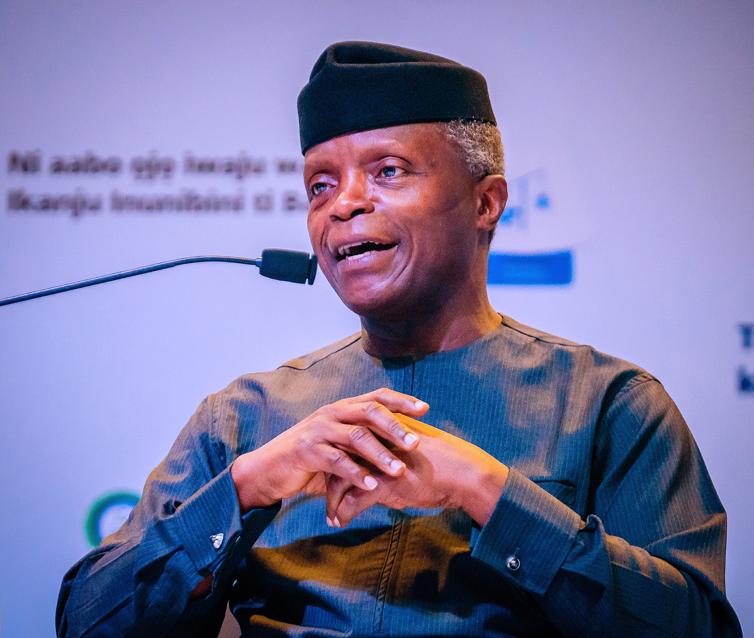
Vice President Yemi Osinbajo has said that in line with the President’s announcement at COP26 in Glasgow for Nigeria’s commitment to net-zero emissions by 2060, Nigeria has made it a priority to provide clean, sustainable and reliable energy access to her citizens.
Osinbajo spoke on Thursday at the Global Launch of the Nigeria Integrated Planning Tool which he attended virtually just after participating at the Extraordinary Summit of ECOWAS in Accra, Ghana.
Senior Special Assistant to the Vice President on Media and Publicity, Laolu Akande, disclosed this in a statement he signed late Thursday titled How to balance global emissions target with Nigeria’s developmental goals, by Osinbajo’.
Osinbajo who noted the importance of achieving net-zero emissions in line with global energy transition said “Providing clean, sustainable and reliable energy access is tied to almost all Nigeria’s development goals. We have proven that transforming our energy system is a national priority through our Economic Sustainability Plan, and most recently with our President’s announcement at COP26 in Glasgow for Nigeria’s commitment to net-zero emissions by 2060.
“Nigeria also faces other challenges, including lifting 100 million people out of poverty within a decade and driving economic growth, bringing modern energy services to the full population, and managing long-term job losses in the oil sector that will result from global decarbonization.”
Speaking on Nigeria’s plan and actions on addressing the various dimensions, as well as the pathways and timelines required to balance emissions reductions with economic development, the Vice President stated that the regime developed a set of scenarios in its Energy Transition Plan, which was done with support from Sustainable Energy for All.
“Based on these scenarios, we developed a roadmap to achieve net-zero by 2060. The transition plan focuses on full electrification of the economy by 2060, including over 250 gigawatts of installed capacity, and a massive build-out of renewable energy capacity. This requires a phased approach with credible milestones and targets and includes a solar-driven capacity increase on an unprecedented scale, which amounts to about 5 gigawatts per year through 2060,” he said.
According to him, the transition to clean cooking will also require a phased approach.
Regarding the cost implications of reaching net-zero emissions by 2060, Osinbajo said Nigeria’s net-zero 2060 pathway also requires around $10bn per year of funding over the next 40 years across the country’s economy, and most of this will be for the power sector.
“The data and evidence that the Energy Transition Plan was based on were instrumental in helping us understand the true scale of effort and resources that would be required.
“Just yesterday the Energy Transition Plan was considered by the Federal Executive Council, while approving it, the President directed that the lead Ministry, the Ministry of Environment engages with all MDAs and stakeholders to develop a robust implementation plan.”
Explaining the usefulness of the recently approved Energy Transition Plan, Osinbajo said it will help determine clear strategies for prioritisation of regions and technology interventions towards making informed decisions that support Nigeria’s energy access by 2030 goals in a comprehensive manner which further supports and complements our net-zero by 2060 ambitions.
On Nigeria achieving universal access to energy by 2030, he stated that “the analysis has shown us we would need an estimated 19.3 million new electricity connections across the country.”
He said the ETP will also help the regime to decide the least-cost approach to achieving these targets, which consists of 5.4 million grid connections, 8.9 million mini-grid connections, and 5 million solar home system connections at a cost of $25.8bn.
Noting that the Integrated Energy Planning tool would be essential in government achieving its stated goals, the Vice President gave a commitment in ensuring “that our various levels and arms of government promote it and use it as broadly as possible.”
He also called on the international community to support Nigeria’s transition efforts through realistic and much-needed climate finance commitments.
Also in attendance at the global launch were the Deputy Secretary-General of the United Nations, Amina Mohammed; CEO and Special Representative of the UN Secretary-General for Sustainable Energy for All, Damilola Ogunbiyi; Minister for Power, Abubakar Aliyu; Minister of State for Power, Godwin Agba, Minister of State for Environment, Sharon Ikeazor; Managing Director of the Rural Electrification Agency, Ahmad Salihijo; Vice President for Infrastructure at World Bank, Riccardo Puliti; President of Rockefeller Foundation, Dr. Rajiv Shah; and other development partners.
Copyright PUNCH.
All rights reserved. This material, and other digital content on this website, may not be reproduced, published, broadcast, rewritten or redistributed in whole or in part without prior express written permission from PUNCH.
Contact: [email protected]




